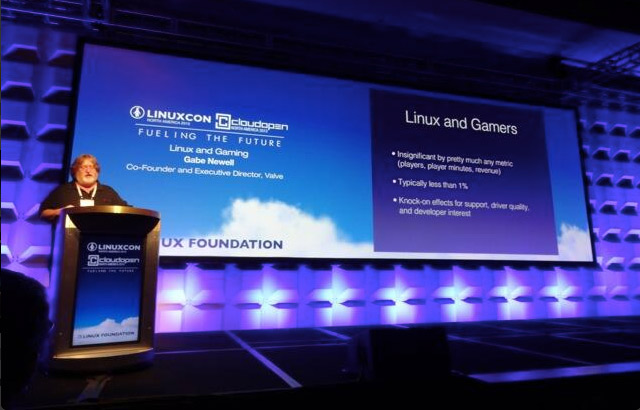Gabe Newell: The Future of Gaming - For Linux
Last year, Gabe Newell, CEO of Valve, made a bet on Linux as a gaming platform. Soon, the company began to implement a new strategy: Steam came out under Linux, and with it all parts of Half-Life 2, Left 4 Dead 2, Portal, and many other games. Valve developers explained why Linux from a technical point of view is a better platform for games than Windows 8.

Yesterday, Gabe Newell spoke at the LinuxCon conference, summed up the year and said bluntly: the future of games is for Linux, despite the modest share of this OS at the moment.
“It's a little strange for me to speak here and tell you guys what the future of the gaming industry is for Linux and open source,” said Gabe Newell. “It’s kind of like coming to Rome and teaching Catholicism to the Pope.”
')
Steam for Linux was released in February , and now there are already 198 games on this platform. Earlier, Newell announced the SteamBox game console (also under Linux). Now he hinted that the official announcement of the console will take place next week.
Installing games under Linux used to have its own features, Newell said. The “just compile it yourself” approach can be inconvenient for installing games and updates, but in Left 4 Dead 2 for Linux, the company showed how to solve these problems.
In addition to the release of the gaming platform itself, Valve is actively helping in the development of the LLDB debugger, and also co-authored a new debugger for Linux that is currently being created.
“When we offered developers: choose one tool that Valve can do to improve Linux as a development platform, they always called the debugger,” Newell says.
Newell used to call Windows 8 “a disaster for the personal computer industry,” and confirmed these words now. Closed platforms will make room open, he said. Valve will only benefit from this: now, despite the decline in PC sales in the world, Steam sales have increased by 76% over the year. “I think we will see either a significant restructuring of the market, or withdrawal from the market of the five largest PC manufacturers. That looks pretty bleak, said Newell. “Systems that are friendly for innovation and open in their essence will have a greater competitive advantage compared to closed or tightly regulated systems.”

Yesterday, Gabe Newell spoke at the LinuxCon conference, summed up the year and said bluntly: the future of games is for Linux, despite the modest share of this OS at the moment.
“It's a little strange for me to speak here and tell you guys what the future of the gaming industry is for Linux and open source,” said Gabe Newell. “It’s kind of like coming to Rome and teaching Catholicism to the Pope.”
')
Steam for Linux was released in February , and now there are already 198 games on this platform. Earlier, Newell announced the SteamBox game console (also under Linux). Now he hinted that the official announcement of the console will take place next week.
Installing games under Linux used to have its own features, Newell said. The “just compile it yourself” approach can be inconvenient for installing games and updates, but in Left 4 Dead 2 for Linux, the company showed how to solve these problems.
In addition to the release of the gaming platform itself, Valve is actively helping in the development of the LLDB debugger, and also co-authored a new debugger for Linux that is currently being created.
“When we offered developers: choose one tool that Valve can do to improve Linux as a development platform, they always called the debugger,” Newell says.
Newell used to call Windows 8 “a disaster for the personal computer industry,” and confirmed these words now. Closed platforms will make room open, he said. Valve will only benefit from this: now, despite the decline in PC sales in the world, Steam sales have increased by 76% over the year. “I think we will see either a significant restructuring of the market, or withdrawal from the market of the five largest PC manufacturers. That looks pretty bleak, said Newell. “Systems that are friendly for innovation and open in their essence will have a greater competitive advantage compared to closed or tightly regulated systems.”
Gabe Newell Performance Video
Source: https://habr.com/ru/post/194042/
All Articles